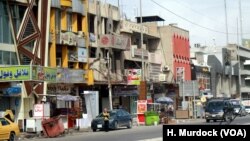In July 2017, while announcing the liberation from ISIS of Mosul, the largest city in Ninewa Province, Iraq’s Prime Minister Haider al-Abadi said that returning children to school as quickly as possible was the Iraqi Government’s top priority.
But fulfilling this intention turned out to be a difficult challenge. That’s because ISIS’ strategy was to not only inflict maximum casualties both on Iraqi security forces and on the local populace, but also to stall economic redevelopment in communities they once held. So as ISIS fighters retreated from town after town, they left behind a landscape sown with explosive hazards, set particularly around critical infrastructure.
This certainly held true for Ninewa Province. After liberation, the landscape was still littered with unprecedented levels of improvised explosive devices, unexploded ordnance, landmines, and other explosive remnants of war.
The U.S. Department of State, through its implementing partner Janus Global Operations, has undertaken the complex and dangerous job of finding and removing these hazards from critical infrastructure associated with the delivery of healthcare, clean water, power, transportation, and education. Enabling the safe return of children to schools helps counter ISIS youth indoctrination, frees adults to participate in stabilization activities, and aids the return to normal life.
In August 2017, Iraqi forces liberated the Ninewa Province city of Tall Afar. By November, a Janus team was assessing what needed to be done to make the Al Shohabeya Primary School there functional again. In less than two weeks, Janus cleared anti-tank projectiles, small arms and improvised explosive devices from the building and formally handed the site over to the school’s headmaster.
Janus also cleared similar explosive hazards from the Kiz Lisesi Secondary School, Tall Afar’s only secondary education school for girls. As a result, 1,650 students have safely resumed their education.
Janus went on to clear explosive hazards from the Al Thawara Primary School for Boys in West Mosul, the Al-Jabal Primary School for Boys and Girls in Bahzani, and many more.
United States-funded clearance operations across Ninewa continue to play a pivotal role by ensuring that schools are free of explosive hazards, thus providing a safe space for children to learn as their families rebuild their communities.














